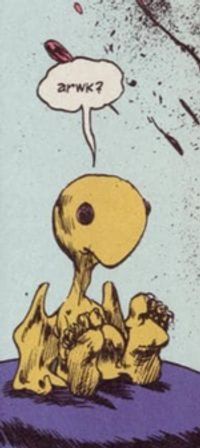The Year of Magical Thinking Reviews
MargoChanning
Broadway Legend Joined: 4/5/04
#1The Year of Magical Thinking Reviews
Posted: 3/29/07 at 8:07pm
Talkin Broadway is Positive:
" Key to particularizing that journey is Redgrave. While she never seems to speak to someone more or less than a cherished friend, she nonetheless elevates her most human of concerns to universal extremes. Whether sitting on a plain wooden chair (as she does for most of the evening), or walking about the stage as though she were pacing on a sunset-drenched terrace, she conjures every pound of the weight Didion assumed, as well as the bone-deep ache - inexpressible in words - spurred by her fading family.
When she redirects that inner pain outward, usually with an accusatory or reproachful tone adopted by someone who insists she knows better than you (and probably does), her rage is both inescapably true and oddly discordant given the sedate surroundings. Director David Hare, who has insisted on minimalism throughout the production (Bob Crowley's set lightly relies on impressionistic photographic backdrops; Jean Kalman's lights impart a disquietingly correct film noir feel), is not at his best at these times, and allows the play to move away from reflection and closer to scolding.
These moments feel like attempts to involve the audience directly in action that wants no active part of them, and that disrupts the tenuous balance that Didion and Redgrave have conspired to create. The outside world too eagerly begins pushing inside at a time you need to remain with her in the realm of her expanding consciousness.
______________________________________________________________
Knowing that one person survived can help you remember you can survive, too. As this quietly sincere and richly affecting play proves, such thinking might well qualify as legitimately magical in its own right. "
http://www.talkinbroadway.com/world/MagicalThinking.html
MargoChanning
Broadway Legend Joined: 4/5/04
#2re: The Year of Magical Thinking Reviews
Posted: 3/29/07 at 8:11pm
AM NY gives it One and a half stars:
"But is this really theater?
Yes, but only in the sense that anything on a stage can technically constitute theater.
Perhaps the problem results from the intensity of Redgrave's performance. Due to the naturalism, she has no desire to reach out to the audience and maintain our attention. Only by literally reading Didion's work could one appreciate her complex language.
The bottom line: Redgrave is a truly compelling actress, and Hare supplies strong production values. But without having read Didion's book beforehand, the monologue comes across as dry, boring and endless. Wouldn't it be more fun to see a real play -- even a bad one?"
http://www.amny.com/entertainment/am-magical0330,0,1098024.story?coll=am-ent-headlines
MargoChanning
Broadway Legend Joined: 4/5/04
#2re: The Year of Magical Thinking Reviews
Posted: 3/29/07 at 8:14pm
The AP is Mixed-to-Negative:
"There is a journalistic precision to "The Year of Magical Thinking," Joan Didion's stage distillation of her best-selling memoir about death and the consequences for those left behind.
That precision, whether dealing with medical facts or emotional responses, informs this adaptation, which opened Thursday at Broadway's Booth Theatre. Didion is an impeccable observer, and when her insights and descriptions are delivered by an actress as accomplished as Vanessa Redgrave, you know the evening will achieve moments of eloquence.
Yet despite the star's formidable presence, "Magical Thinking" still works better on the page than on the stage. Didion's language is cerebral and exact; her musings punctuated by careful and detailed research. It doesn't easily lend itself to theater."
http://www.sfgate.com/cgi-bin/article.cgi?f=/n/a/2007/03/29/entertainment/e141728D00.DTL
#3re: The Year of Magical Thinking Reviews
Posted: 3/29/07 at 8:15pmThanks for starting the thread Margo. Can't wait to see what The NY Times has to say.
MargoChanning
Broadway Legend Joined: 4/5/04
#4re: The Year of Magical Thinking Reviews
Posted: 3/29/07 at 8:19pm
Newsday is Positive:
"The Year of Magical Thinking" is 90 minutes of spellbinding theater.
Anyone must wonder who read Joan Didion's bestselling memoir of 2005, or scanned the pounds of newspaper excerpts and stories that accompanied its overwhelming reviews, then followed the admiring TV segments and the advance stories that preceded last night's opening of the adaptation at the Booth Theatre.
That is, anyone must wonder how the theater will ever find anything left unsaid about the abyss of grief after the deaths of her husband, fellow novelist John Gregory Dunne, in 2003 and, their adult daughter, Quintana, 20 months later.
The answer is Vanessa Redgrave. In an electrifying confluence of formidable females, this magnificent actress has reached her long, lean tentacles into Didion's deep, lean recollections, fastens those pewter eyes on a space beyond the audience and dares us to think that we have ever before heard any of this exquisitely told story. More, she makes it feel unseemly for us to acknowledge that, perhaps, we've even thought any of these mourning words ourselves.
________________________________________________________________
There is banality in certain observations presented as profound insights. Some might resent the privilege of someone, despite unfathomable loss, who has the Beverly Wilshire to keep her warm, and access to a private jet to bring her daughter home. But convenience is hardly the same as comfort.
When Redgrave breaks her measured calmness and moans, "I want him back," her mouth is suddenly a black hole that no amount of magical thinking can fill. And it is horrible and wonderful at once.
http://www.newsday.com/entertainment/stage/ny-etledew5149497mar30,0,7320696.story?coll=ny-theater-headlines
MargoChanning
Broadway Legend Joined: 4/5/04
#5re: The Year of Magical Thinking Reviews
Posted: 3/29/07 at 8:26pm
Charles McNulty of the LA Times is Mixed-to-Positive:
"Amid much highbrow chatter, "The Year of Magical Thinking" opened Thursday at the Booth Theatre in a production that was adapted by Didion from her bestselling book and directed by British playwright David Hare. It's hardly your typical Broadway fare, with its static talking-essay form and grim public exposure of a recent private bereavement. On paper it shouldn't work. And for many it won't. There are flaws in the conception and execution of the piece, and Redgrave's otherworldly performance is bound to have an army of detractors.
But this dramatic meditation on what most of us would rather not intimately consider — mortality as a personal fact — is remarkable for its ruthless concentration and intelligence. Intermittently frustrating as a theatrical experience, it slowly but inevitably crescendos in moments that are shattering in their naked candor.
_______________________________________________________________
The adaptation could be better shaped. Theater demands more structural discipline than a first-person essay. And the production's pitilessly Spartan aesthetic makes you resentful of any rambling.
Distractingly cast against type though she is, Redgrave honors this journey not by mimicking it but by processing it through her own sublimely empathic instrument. With palms occasionally outstretched as though she were holding a séance, she channels a saga that belongs to more than just one inimitable writer.
No one would ever mistake the two women, but near the end, there was a convergence that seemed to qualify as a genuine instance of magical theater.
http://www.calendarlive.com/stage/cl-et-year30mar30,0,422769.story?coll=cl-home-more-channels
MargoChanning
Broadway Legend Joined: 4/5/04
#6re: The Year of Magical Thinking Reviews
Posted: 3/29/07 at 8:42pm
Variety is Positive:
"Joan Didion's best nonfiction writing has always been distinguished by a rare balance between probing personal reflection and clear-eyed reportorial detachment. That combination found a new acuity in her shattering 2005 memoir, "The Year of Magical Thinking," which chronicled the loss of her husband, John Gregory Dunne, while at the same time dealing with the illness of their daughter, Quintana. Adapting the book for the stage, Didion has filleted the text into a spare but compelling solo piece. Whether or not it's a play is difficult to judge in David Hare's audaciously austere production, given how inextricably linked the work is to Vanessa Redgrave's riveting interpretation. But regardless of how it's classified, this is unmissable theater.
_______________________________________________________________
The actress is not so much playing Didion as channeling her experience. Physically, the two women couldn't be less alike. Didion is tiny, birdlike and frail; Redgrave is tall, robust and regal, capable of generating the most turbulent emotions onstage. But seated on a wooden chair centerstage for most of the performance, she draws herself in with quiet intensity, her shock of white hair and haunted eyes seeming to radiate their own light.
The expressiveness of Redgrave's eyes or her beautiful hands, with long graceful fingers, provide as mesmerizing a focus as her words. Like her occasional, brief animation to anger or excitement, her gestures are always subtle and economical, with only an almost imperceptible slump of her shoulders conveying her final acceptance of death as intransmutable fact. Or those eyes -- febrile and alert as they seek out and engage the audience throughout the play, frequently filled with surprising humor and lightness -- drifting off to stare blankly at the back wall in sorrow."
http://www.variety.com/review/VE1117933237.html?categoryid=33&cs=1
#7re: The Year of Magical Thinking Reviews
Posted: 3/29/07 at 8:46pm
Psh- Any modern theatre critic who is not a pretentious snob should recognize that this show is utterly bland, boring, and has no redeemable features other than Redgrave.
Thanks for the thread, Margo!
MargoChanning
Broadway Legend Joined: 4/5/04
#8re: The Year of Magical Thinking Reviews
Posted: 3/29/07 at 9:54pm
Theatremania is Mixed-to-Positive:
"Redgrave is not yet a paragon of Didionesque perfection. In the few moments when she is asked to forfeit control of her carefully modulated speaking, she loses a grip on conviction. For instance, there's the moment when Didion is damning herself for not saying something she now thinks magically might have blocked the inevitable.
The mundane words Didion remembers she spoke are "What shall we do for dinner?" Redgrave shouts them in anger, but the anguished question seems less a cry from the heart than a response to a possible request from director David Hare -- who otherwise guides the proceedings with a sympathetic, invisible hand -- for some decibel variety. And there's at least one other outburst in the same vein.
It's in the quietest moments where Redgrave's high-wattage inner lights blaze, illuminating Didion's dimmed inner light. Using a mid-Atlantic accent, Redgrave downplays the high-tragedy demeanor that Didion sometimes exhibits in public. Moreover, anyone who cherishes Redgrave's abilities in other transcendent acting sequences will recognize the bruised wonder that comes into her eyes and the identifiable loss of assurance in her limbs.
________________________________________________________________
Although Year of Magical Thinking is billed as "a play by Joan Didion," it's only a play in the broadest sense. It is, however, a not-to-be-missed elegy on inexplicable, unavoidable loss."
http://www.theatermania.com/content/news.cfm/story/10397
MargoChanning
Broadway Legend Joined: 4/5/04
#9re: The Year of Magical Thinking Reviews
Posted: 3/29/07 at 10:17pm
Brantley is Mixed-to-Positive:
"The substance is in the silences in “The Year of Magical Thinking,” the arresting yet ultimately frustrating new drama starring Vanessa Redgrave that opened last night at the Booth Theater.
____________________________________________________________
Some moments — yes, silent ones — are remarkable. I have not, for example, been able to erase from my mind Ms. Redgrave’s face from an early scene. It’s after she, as Ms. Didion, has spoken of seeing her husband silent and slumped in a chair in their apartment at the end of a trying day. “I thought he was making a joke,” she says. “Slumping over. Pretending to be dead.”............In that small second or two Ms. Redgrave’s magnificent face, wry and wounded, is the reproachful emblem of the guilt and exasperation that the living so often feel toward the dying and the dead. There is also reflected that disorientation that comes from a death’s abrupt way of changing the rules by which you have always lived your life.
Such moments erupt often enough throughout this production, which is directed with austere eloquence by the playwright David Hare, to raise the show well above the level of an audiotape. Students of acting are advised to buy tickets as close as possible to the stage to observe the presence and craft that allows one woman to hold an audience’s attention for 90 uninterrupted minutes.
But while my eyes never left Ms. Redgrave, I was also never free of a nagging dissatisfaction. I never felt I knew who this woman was. The big emotions register luminously. But do they connect with the portrait of someone who was described on the night of her husband’s death by a hospital social worker as “a pretty cool customer”? Much of what Ms. Didion depicts in her book is the state of self-preserving numbness that descends in crisis.
Ms. Redgrave doesn’t do numb. She never seems more naturally herself here than when she is quoting, radiantly, from the medieval poem “Sir Gawain and the Green Knight.” As an artist she works on a heroic scale. Ms. Didion is a miniaturist, even when her subjects are vast.
________________________________________________________________
The consolation is that Vanessa Redgrave is Vanessa Redgrave, and she has her own means of plumbing depths. Watch, for example, the attention she gives to a bracelet on her arm, and how she develops it. It will break your heart.
There is no doubt that she is a great artist. So is Ms. Didion. The problem with “The Year of Magical Thinking” is that their artistry pulls in different directions."
http://www.nytimes.com/2007/03/30/theater/reviews/30magi.html
Yankeefan007
Broadway Legend Joined: 3/20/04
#10re: The Year of Magical Thinking Reviews
Posted: 3/29/07 at 10:23pmI wouldn't call that a very positive review (aside from his comments about Ms. Redgrave). "Ultimately frustrating" and "artistry pulls in different directions," don't make good pull quotes.
MargoChanning
Broadway Legend Joined: 4/5/04
#11re: The Year of Magical Thinking Reviews
Posted: 3/29/07 at 11:14pm
USA Today is Three out of Four Stars:
"The play, directed with rigorous elegance by David Hare, is marked by the same lack of sanctimony and sentimentality. Dignity is the word that comes to mind in describing Redgrave's performance and Didion's script. The latter incorporates Quintana's death after the book was completed, allowing the writer to explore the tortured mix of denial, guilt and helplessness that accompanied this second, more drawn-out tragedy.
________________________________________________________________
And the scrupulous integrity of Didion's writing, her refusal to indulge in cheap theatrics, demands that Redgrave use the full weight of her presence while also showing great reserve.
The actress meets that challenge, of course, mining the wit and grace of Didion's words and the mind-bending sorrow of her experience. Redgrave does this, miraculously, while remaining seated through most of the show, imparting expressive powers to such simple gestures as clutching her hands or playing with her hair.
Toward the end, Redgrave, standing, reads an excerpt from Didion's book, beginning, "Grief turns out to be a place none of us know until we reach it." Maybe so, but Magical Thinking, in its unfussy way, brings us a little closer."
http://www.usatoday.com/life/theater/reviews/2007-03-29-magical-thinking_N.htm
#12re: The Year of Magical Thinking Reviews
Posted: 3/30/07 at 1:45amNot the brilliant kind of reviews one would have hoped for with Redgrave/Didion at the helm. Decent, but nothing earth shattering. Guess I can cross this one off my list of must see's...kinda disapointing.
#13re: The Year of Magical Thinking Reviews
Posted: 3/30/07 at 8:14amWith all due respect, I wouldn't cross this or any show off your must-see list because the reviews were mixed. A high percentage of shows have a mixed reception, and how many times have we flocked to the sure-thing and found it overrated? Moreover, I think the combo of disparate elements -- Dideon, Hare, Redgrave -- make this a unique event. But of course, it's very subjective; we all have $$ to weigh, and must pick and choose. (And we do reconsider as shows run: Personally, I'd written off TALK RADIO as been there/done that... and now feel compelled to revisit that material if only to see the leading performance.)
#14re: The Year of Magical Thinking Reviews
Posted: 3/30/07 at 9:37am
Remember that the subject matter - death - is also drawing out some aversion reactions from the reviewers that they are expressing as part of the review. This is fascinating to me because everyone seems to have very specific expectations about the translation of Didion's book into theater. I can't believe that any one prodcution could meet all those expectations.
#15re: The Year of Magical Thinking Reviews
Posted: 3/30/07 at 11:22am
Just read the Wall Street Journal's review. Not so good. My friend who saw it last week pretty much said the same thing this review does. Here it is...
http://online.wsj.com/article_email/SB117520892612853793-lMyQjAxMDE3NzM1MDIzMDA4Wj.html
#16re: The Year of Magical Thinking Reviews
Posted: 3/30/07 at 11:45am
What an opening night? Anyone surprised to see Clint Eastwood and Jane Fonda together? Aren't they politically oppossites?
Not like you can't be friends with someone who doesn't share your political ideas, but it seems weird since they are both so passionate.
#17re: The Year of Magical Thinking Reviews
Posted: 3/30/07 at 11:49amI'm not crossing it off my list - reviews aside, any chance to see Vanessa Redgrave should not be passed up. Even when she's off (and she has been) she's mesmerizing to watch.
#18re: The Year of Magical Thinking Reviews
Posted: 3/30/07 at 11:52amyeah...tons of big name celebrities showed up last night! i hope Rosie talks about it on The View on Monday.
#19re: The Year of Magical Thinking Reviews
Posted: 3/30/07 at 11:56amI would see it also. I tend not to go by reviews. If I want to see a show, I see it. As bad as the reviews for "Hot Feet" were I went because Earth, Wind & Fire are my all time favorite group. Yes, the show was bad, but I enjoyed the music and am glad I saw it.
#20re: The Year of Magical Thinking Reviews
Posted: 3/30/07 at 11:57amOverall, the reviews were certainly not negative...mostly mixed-to-positive. This show is defnitely worth seeing, IMO.
#21re: The Year of Magical Thinking Reviews
Posted: 3/30/07 at 12:01pm
Clive Barnes gives the show 3 out of 4 stars in the NY Post and writes that "Slowly, with the certainty of theatrical genius, nothing matters, as Redgrave - assisted by Hare and Bob Crowley's scenic design, which is simply a series of collapsing curtains patterned like watered silk - takes both text and audience into a never-never land of acceptance. Those calculated phrases and unlikely detachment as she seeks to escape from her sense of what she calls "a vortex" of pained remembrance dissolve into a performance so intense in its casual passion that a stilted literary expression is transformed into a reality of life. This is acting at its grandest."
philcrosby
Broadway Legend Joined: 2/17/04
#22re: The Year of Magical Thinking Reviews
Posted: 3/30/07 at 12:49pmIf Vanessa Redgrave were reading the phone book, she would still be worth the ticket price.
RentBoy86
Broadway Legend Joined: 2/15/05
#24re: The Year of Magical Thinking Reviews
Posted: 3/30/07 at 12:55pmSo is there a set for this? A show curtain? or is it pretty much a blank stage?
Videos








